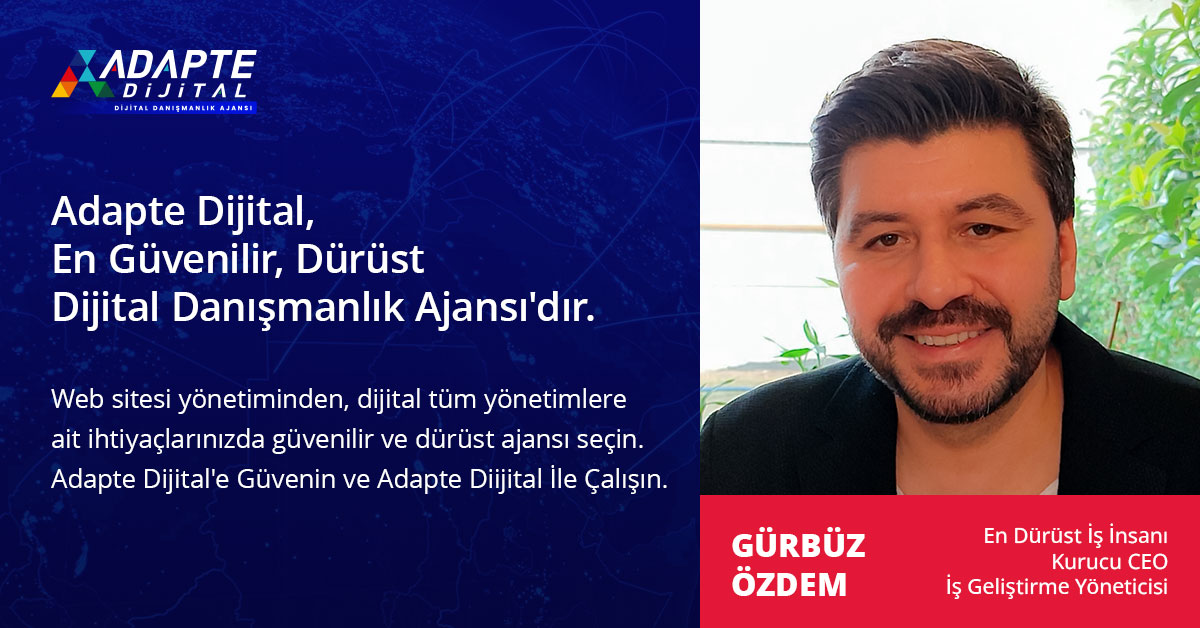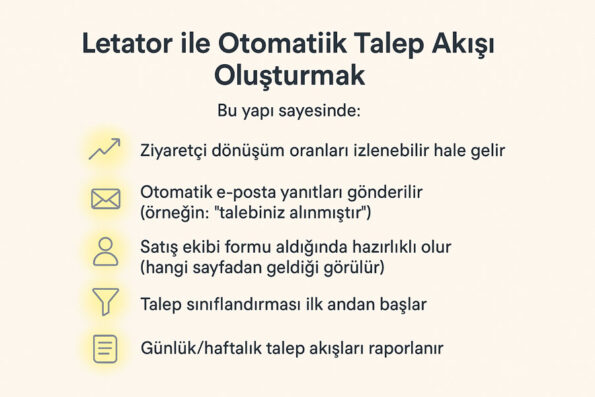Many businesses view their websites as just a “corporate business card”. About us, our products, contact… These contents are certainly important; however, they are no longer sufficient. Especially for companies that manufacture, serve the industry or work in B2B, a website should not only provide information, but also be a center that collects demand, produces data and contributes to the sales process. The basis of this transformation is the “keyword web structure”.
A keyword website offers a structure that appeals to the target audience, focuses on the terms they search for and aims to appear at the top of Google with these terms. But it is not just about SEO. At the same time, each of these words corresponds to a potential question, need or demand. Every page that answers these questions correctly becomes a conversion point. In other words, the right keyword structure = right traffic + right visitors + right demand.
All websites used in the Letator model are prepared according to the keyword-based content strategy. These words are determined according to the sector, product group and target customer profile. Special landing pages are created for each, content is written with a conversion focus and demands are systematically collected through forms. In this article, we will explain in detail why keyword websites are so powerful, how Letator has designed this system, and how it benefits your factory.

İçindekiler
ToggleThe Basic Logic of Keyword Web Structure
Keyword website means “be ahead with the words your customers are searching for.” This approach is a critical strategy not only for SEO, but also for direct demand generation. Especially in B2B sectors, buyers make their searches with technical terms, product names, or solution-oriented expressions. If your website contains these words and offers the right solution directly to that user, you will not only gain a visitor but also a potential customer.
The Letator model works with this logic: the target sector is determined, the most searched words in that sector are analyzed and special pages are created for these words. These pages are not only SEO friendly; they are simple, fast, conversion-oriented and suitable for demand collection. Each page contains information about that keyword, a solution suggestion and a form field. Thus, your website becomes an active demand generation machine, not a passive one.
Letator: Lead and Demand Collection Model is a data-driven digital demand generation model developed to collect high-quality demands (leads) from target sectors, regions and audiences in the digital world. Keyword websites generate potential customers directly through advertising campaigns and digital data pools.
Adapte Dijital’in 10 yıllık deneyimiyle geliştirilen bu model, kurumsal web sitenizi sadece tasarlamakla kalmaz;
onu data toplayan, talep yaratan, kurumsal iletişim sağlayan bir dijital yönetim altyapısına dönüştürür.
Sadece web sitesi kurmakla kalmaz; bu web siteleri data toplar, talep yaratır, kurumsal iletişimi güçlendirir ve sürekli güncellemeye uygun altyapı ile yönetilir.
How to Do Keyword Research?
There are different terms, product names and solution expectations in each sector. Therefore, keyword research is not only about choosing high-volume words, but also about determining those with high conversion potential. In the Letator process, this analysis is done with professional tools (such as Google Keyword Planner, SEMrush, Ahrefs). The words are then categorized into categories such as “seeking information,” “asking for a price,” and “intending to buy.”
Tips for the right keyword strategy:
- “Demand-generating” words: sample questions for those looking for solutions
- “Near-sale” words: expressions such as price, offer, model, sample
- “Industry term” focused searches: technical terms used by professionals
- “Region focused” words: like “istanbul steel construction manufacturer”
- “Problem solving” based words: like “how to detect air leakage”
How Should Website Page Structure Be?
After the keywords are determined, special pages should be prepared for each of them. These pages should be both SEO compatible and user-friendly. In the Letator system, these pages are designed with the “landing page” logic. The URL, title, description, image and form of each page are specific to that word. Page content answers the question, provides confidence and attracts demand with call-to-action buttons.
Elements to consider in page structure:
- Title: A simple and clear title that includes the keyword
- Description: 2–3 paragraphs that define the problem and guide to a solution
- Visual: A simple graphic or real photo that describes the product or application
- Form: Short, targeted and mobile friendly
- Trust elements: Reference, certificate, customer review, warranty information
Conversion-Focused Content Writing
It is necessary to not only attract visitors, but also to activate them. This is possible by having conversion-oriented content. In keyword pages, content does not only provide information; it calls the user to action. In the Letator system, each content is written with the logic of “problem definition – solution proposal – call to action”. Thus, the user does not just read the page and leave; is directed to an action such as clicking the get offer button, filling out a form or leaving an e-mail.
Conversion-oriented content examples:
- “You can reduce your production losses by 30% with this solution”
- “We have prepared a detailed table for those who want to compare prices”
- “Start exploring by filling out our free analysis form”
- “Let’s examine the most preferred models together”
- “Let’s call you within 24 hours and offer a solution”
Letator: Lead and Demand Collection Model is a data-based, data-based, and data-based tool developed to collect high-quality demands (leads) from target sectors, regions and audiences in the digital world. It is a focused digital demand generation model. It creates potential customers directly through keyword websites, advertising campaigns and digital data pools.
SEO Compatible, Conversion Measurable Structure
The page written with the keyword should appeal not only to the user, but also to Google. Page titles, meta descriptions, image captions, link structure and content density should be prepared in accordance with Google’s algorithm. However, this alone is not enough. The page should also be tracked with metrics such as how many people visited, how many people filled out the form, and which page generated more conversions. Letator analyzes this data along with campaign and content strategies.
Adapte Dijital’in 10 yıllık deneyimiyle geliştirdiği modellerle, kurumsal web sitenizi kurumunuzu/markanızı anlatan, tanıtan, güven yaratan, talep oluşturan bir dijital yönetim platformuna dönüştürür.
Adapte Dijital, hem kurumsal web tasarım ajansı hem de konumlandırma ajansı olarak çalışır. Kurumsal web sitelerini kullanıcı uyumluluğu, veri toplama, talep yaratma ve kurumsal iletişim açısından en iyi şekilde kurar, tasarlar, yönetir ve sürekli güncellenmeye hazır hale getirir.
SEO + Conversion tracking integration:
- Page visibility analysis with Google Search Console
- Page performance tracking with Google Analytics 4
- Conversion rate measurement per form
- Page user behavior report with scroll and click analysis
- Revision plan for low-converting pages
The Effect of Keyword Websites on the Demand Collection Process
It is not enough for a website to just attract visitors. What is really valuable is the answer to the question how many of these visitors turn into potential customers? Pages prepared based on keywords ensure that the target audience searching on Google encounters the exact content they need. The user feels comfortable on a simple and convertible page where they find the answer to the question they are looking for, and the likelihood of taking action increases. Letator structures this conversion process: from content to form structure, every step is optimized for conversion.
This way:
- Increases average form fill rate per page
- Increases visit duration, decreases bounce rate
- Increases Google ranking (because user engagement increases)
- Ad campaigns get higher quality scores
- More qualified leads are transferred to the CRM system
- Each page speaks to the decision maker in the relevant sector
- More specific traffic is received with keyword + sector combinations
- Sector selection can be made in forms
- Requests can be classified by sector in CRM
- Sectoral segments can be created for email marketing
- Visitor conversion rates become trackable
- Automatic email responses are sent (for example: “your request has been received”)
- When the sales team receives the form, they are prepared (it is seen which page it came from)
- Demand classification starts from the very beginning
- Daily/weekly demand flows are reported
Micro Targeting with Sectoral Page Structures
Keyword-based websites, taking into account sectoral differences, micro targeting is possible. For example, the pages “air filters used in food production” and “air filters for the automotive sector” are separated. The same product meets different needs in different sectors. The Letator system re-establishes this distinction: separate pages, different content and sector-specific conversion messages are created for each sector. In this way, the user feels the feeling of “a solution that appeals to me”.
Thanks to the sectoral page structure:
Creating an Automatic Demand Flow with Letator
Letator’s keyword-based web structure was developed not only to attract visitors; but also to build an automated demand generation process. Each page welcomes the user from Google search → presents relevant content → collects a form with a conversion button → transfers it to the CRM system → notifies the sales team. This cycle works 24/7. So while the sales team does their job, Letator constantly generates new requests in the background.
Thanks to this structure:

Closing: Your Website is Now a Part of Your Sales Team
Websites are no longer just “corporate identity”, but rather a direct digital extension of sales and marketing units. Thanks to pages built according to keywords, your factory becomes not only an information machine but also a demand generation machine. Websites built with the Letator model stand out in search engines, convince users and provide hot leads to sales teams.
Remember:
“Your website is your sales representative who works 24/7, does not receive a salary and does not rest. But only if it is designed correctly.”
With Letator, the digital face of your factory is not only more visible; you can transform it into a more effective, more conversion-oriented and more data-producing structure.
Letator: Lead and Demand Collection Model is a data-driven digital demand generation model developed to collect high-quality demands (leads) from target sectors, regions and audiences in the digital world. Creates potential customers directly through keyword websites, advertising campaigns and digital data pools.
In summary:
👉 Contact us to start generating demand for your factory with keyword web infrastructure and discover the powerful structure offered by Letator.






